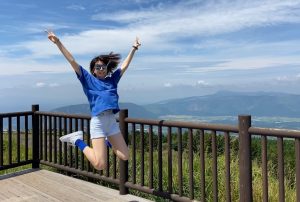OSIPP留学生対談 vol.3 研究生
2022.5.24

In addition to enrollment as a regular student, OSIPP has a system that allows students to take courses as a “research student”. For this issue, I interviewed Ms. Sun Yuxin (China) and Ms. Xu Zhuan (China), who were research students in 2020, and Ms. Zeng Jiayi (China), who was a research student in 2021.
First of all, please describe your academic career before you’d been research students at OSIPP.
(Ms. Sun) I majored in Japanese Literature as an undergraduate at a Chinese university, started studying as a research student at OSIPP for one semester in the fall semester of 2020. I came to Japan in December, and entered OSIPP’s Master’s program in April 2021.
(Ms. Xu) I studied linguistics, mainly English, at a university in China. After that, I am exactly the same as Ms. Sun.
(Ms. Zeng) I studied public policy at a Chinese university and became an OSIPP research student for a semester starting in October 2021. Due to the boarder restriction caused by the spread of the COVID-19, I was finally able to come to Japan yesterday.
How did you come to choose OSIPP?

At Mt. Aso in Kyushu(Ms.Sun Yukin)
(Ms. Sun) When I was an undergraduate student, I came to Osaka on a trip and liked the city so much that I decided to study here. I was originally aiming for the Graduate School of Letters of Osaka University based on my major in the undergraduate course. However, I got to see a former professor in OSIPP at a conference in Beijing then knew about OSIPP. I also had interest on economics and social policy, so I thought in OSIPP I can do my research in the field of my interest since OSIPP is interdisciplinary.
(Ms. Xu) I was also originally thinking about studying at the Graduate School of Language and Culture at Osaka University, but I felt that language itself was not enough and I should acquire knowledge in economics and sociology. At that timing, a senior undergraduate introduced me to an OSIPP faculty member. I heard from him that OSIPP focuses not only on research related to economic theory but also on empirical research, which made me feel OSIPP attractive.
(Ms. Zeng) I had experienced a one-year exchange program in Japan when I was an undergraduate student in China, and I wanted to go on to graduate school in Japan in the future. I became interested in a university in Osaka because I was attracted to Osaka on a trip. I felt that Osaka is a city that easy to live in and fit in, with its unique urban advantages in terms of convenience, but also has a surprisingly folksy side to it in terms of lifestyle. During the trip, I encountered a rainstorm, so I couldn’t go to the scheduled trip, but I happened to come across an open science museum nearby and went in for a long time, which also made me very happy. That’s what attracted me about Osaka, that whatever happened, there must be something fun to discover. The fact that graduating from Osaka University would give me an advantage in finding a job in China and in taking the civil service exam also encouraged me entering Osaka University. I majored in public policy as an undergraduate student, so I was attracted to OSIPP because I could specialize in that field and also learn about economics from a beginner’s level.
Why did you decide to become a research student instead of a regular student?
(Ms. Sun) My graduation from the Chinese university was in June, and the entrance to OSIPP is in April, so there was a 10-month blank. Rather than spending the time doing nothing, I wanted to use it effectively, such as preparing for graduate school, so I became a research student in the fall.
(Ms. Zeng) At first, I was not sure whether to go to a language school or become a research student during that blank. I finally chose to become a research student because as a research student I will have the opportunity to receive advice to my research from professors and attend classes on specialized subjects while using Japanese, whereas at a language school I would only study Japanese.
How exactly did you spend your time as a research student?

At Mt. Aso in Kyushu(Ms.Xu Zhuan)
(Ms. Xu) Since I had no background in economics, I took introductory micro- and macro-economics courses for undergraduates and basic statistics and econometrics courses to acquire basic economics knowledge for my research. In order to prepare for writing a thesis, that would begin in earnest after entering the Master’s Program, I took classes on how to write a social science dissertation and participated in graduate school seminars to learn about the research activities of my seniors. As a research student, I cannot get any credit for them though.
(Ms. Zeng) I took political science-related classes that I had studied as an undergraduate. As I had gained the basic knowledge from Chinese university, I did not find it too difficult. I gradually got used to a different teaching style from my undergraduate days, in which I did not just listen to the class, but prepared by reading many reading assignments before the class and actively discussed in the class. I also brushed up my research plan little by little as I gained new knowledge in class.
What was the best thing about entering the program after the research student period?
(Ms. Xu) I was able to get used to life in Japan while there was no pressure to earn credits. If you come to Japan with admission to the Master’s Program, you will start research activities and classes in a completely unfamiliar environment with a different language and culture. But if you have a certain time as a research student, you have time to get used to the environment.
(Ms. Sun) Another advantage is that you can take the same classes twice, once when you are a research student and once after you enroll as a regular student. As a research student, you cannot earn credit, so you will not marked as a terrible grade. You can listen to a class even it is currently at a difficult level once as a research student and have a general understanding of it, and then when you enroll as a regular student, you can concentrate especially on the parts you did not understand before.

In Chengdu, Sichuan(Ms.Zeng Jiayi )
(Ms. Zeng) In my case, I could not come to Japan due to the boarder restrictions, but I was still able to get an idea of what it is like to study at OSIPP through online classes. I am glad that I had time to get used to the new learning style before the limited two-year period of the Master’s program.
This is the end of our interview! Thank you so much for today!
OSIPP Research Student:https://www.osipp.osaka-u.ac.jp/ja/admission/admission-information/#kenkyusei
******************************************************************************
OSIPPでは、正規学生としての在籍以外に、「研究生」として科目を履修できる制度があります。今回は、2020年度に研究生だった孫 ウキンさん(中国)と徐 展さん(中国)、2021年度に研究生だった曾 嘉懿さん(中国)にお話を伺いました。
まずはOSIPPの研究生になるまでの経緯について教えてください。
(孫さん)中国の大学の学部で日本文学を専攻していました。2020年の秋学期から1学期間OSIPPの研究生として勉強を始め、その年の12月に来日し、2021年の4月にOSIPPの博士前期課程に入学しました。
(徐さん) 私は、中国の大学で英語を中心とする言語学を学んでいました。その後は孫さんと全く同じです。
(曾さん) 私は、中国の大学で公共政策を勉強し、2021年10月から1学期間OSIPP研究生になりました。コロナウイルスの蔓延による入国制限があったため中国でオンライン授業を受けていましたが、3月にやっと日本に来ることが出来ました。
OSIPPを選択した経緯を教えてください。

九州の阿蘇山にて(孫 ウキンさん)
(孫さん) 学部生時代に旅行で来た大阪を気に入り、是非ここに留学したいと考えた際に、中国でも有名だった大阪大学に興味を持ちました。学部では日本文学を専攻していたので、何となく文学研究科を目指していましたが、北京で開かれた学会に出席されていたと知り合ったことで、この研究科の存在を知りました。私は経済学と社会政策にも興味があり、学際的に学べるOSIPPでなら自分の興味分野に対する研究を行いやすいと思いました。
(徐さん) 私も、元々は大阪大学の言語文化研究科を目指していましたが、語学だけでは不十分ではないかと感じ、経済学や社会学の知識を身につけた方が良いのではないかと考えました。そんな時に、学部の先輩にOSIPPを紹介してもらい、OSIPPでは経済理論に関する研究だけでなく、実証研究にも力を入れていると聞いたことから、OSIPPに惹かれるようになりました。
(曾さん) 中国での学部生時代に1年間、日本での交換留学を経験しており、将来は日本の大学院に進学したいと思っていました。大阪の大学に興味を持ったのは、旅行で大阪という都市に魅力を感じたことがきっかけです。大阪は、都会で便利な側面があるのと同時に、素朴な面も持ち合わせていて、とても住みやすそうだと感じました。また旅行中に大雨に見舞われ、何も計画通りにできなかったのですが、偶然私がいた場所の近くに科学館があり、思いがけずとても楽しく過ごすことができました。そのような経験から、大阪ではどのようなことがあっても、面白いことが見つかる場所なのだろうという印象を持ちました。、さらに、大阪大学を卒業すると中国での就職や、公務員試験の受験に有利になるので、大阪大学を志望しました。OSIPPを選択したのは、学部生時代に専攻していた公共政策(政治系)を専門に学ぶことができ、かつ経済学を初学者のレベルから学ぶことができるからです。
正規学生としての入学ではなく、先ずは研究生となった理由を教えてください。
(孫さん)中国の大学は卒業が6月でOSIPPへの入学は4月なので10か月のブランクがありました。何もせずに過ごすより、大学院の準備など有効に使いたいと思い、秋から研究生になりました。
(曾さん) 私は、その期間を語学学校に通うかと研究生になるか、どちらで過ごすか迷っていました。語学学校だと日本語の勉強しかできないのに対して、研究生になると教授から研究の指導を受けたり、専門的な内容の授業を聴講したりしながら、日本語に触れる機会もあるため、研究生となることを選びました。
研究生期間、具体的にどのように過ごしましたか?

九州の阿蘇山にて(徐 展さん)
(徐さん) 経済学のバックグラウンドがなかったため、学部生向けのミクロ・マクロ経済学の入門の授業や統計・計量経済学の基礎科目を聴講し、研究に向けて経済学の基礎を固めました。また、博士前期課程入学後から本格的に始まる論文の執筆に備えるため、社会科学の論文の書き方に関する授業を受講したり、大学院のゼミに参加したりして先輩方の研究活動について学びました。
(曾さん) 私は、学部で学んできた政治学系の授業を聴講しました。学部生時代に基礎を理解していたので、難解に感じることはなかったのですが、“授業の前には多くのreading assignmentを読んで準備し、授業中はただ聞くだけではなく積極的に議論に参加する”という学部時代とは異なる授業スタイルに、少しずつ慣れていった期間だったと思います。また、授業で新たな知識を得ながら、少しずつ研究計画をブラッシュアップしていきました。
研究生期間を経て入学したことで、良かったことは何ですか?
(孫さん)研究生時代と正規学生としての入学後、同じ授業を2度受けることも可能な点です。研究生の場合、授業は聴講のみなので、悪い成績がつくことはありません。難しいと思われるレベルの授業を研究生の時に一度聞いておき、大まかに理解した上で、正規学生として履修したときに、以前は分からなかったところを特に集中して勉強することが出来ました。

四川省成都市にて(曾 嘉懿さん)
(徐さん) 単位取得というプレッシャーがない間に、日本での生活に慣れることが出来たことです。博士前期課程への入学時に来日した場合、言葉も文化も異なる全く慣れない環境の中で研究活動や授業が始まりますが、研究生という期間があると、環境に慣れる時間を確保できます。
(曾さん) 私の場合、入国制限の影響で来日できませんでしたが、それでもオンライン授業によりOSIPPでの勉強というものがどのようなものなのかを先に知ることが出来ました。博士前期課程は2年間という限られた時間の前に、新しい学習スタイルに慣れる時間があって良かったと思っています。
OSIPP研究生:https://www.osipp.osaka-u.ac.jp/ja/admission/admission-information/#kenkyusei
貴重なお話をお聞かせいただき、ありがとうございました。
(OSIPP博士前期課程 中瀬悠)
